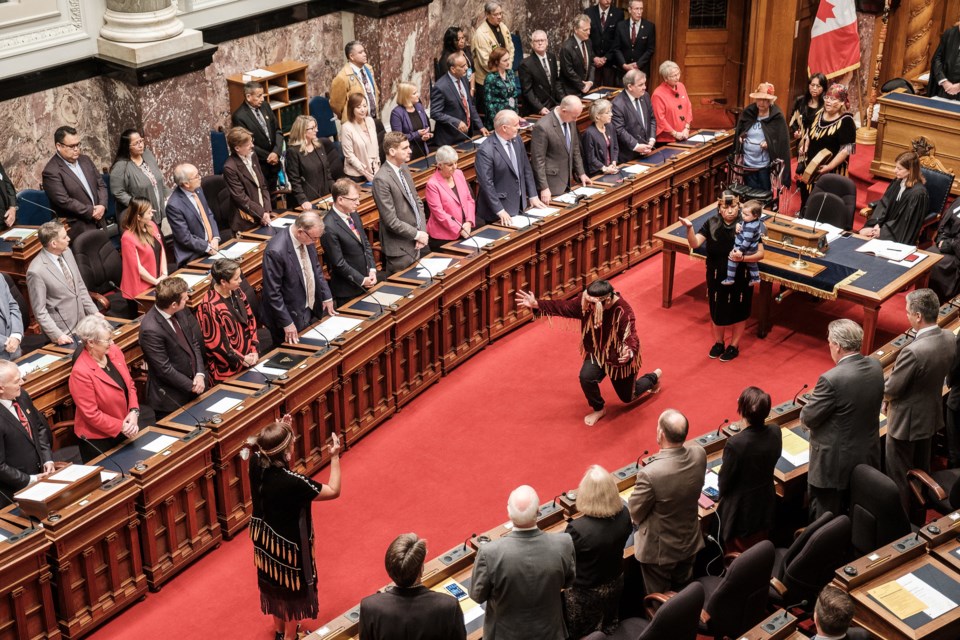History was made in 2019 when B.C. became the first jurisdiction in North America to embrace the UN Declaration on the Rights of Indigenous Peoples (UNDRIP) in the form of new legislation, the Declaration on the Rights of Indigenous Peoples Act (DRIPA).
This bold step towards reconciliation was adopted by the legislature when all 87 MLAs voted in favour of this precedent-setting legislation. According to the B.C. government, the new law was meant “to create a path forward that respects the human rights of Indigenous Peoples while introducing better transparency and predictability in the work we do together.” This new path was created to stop the violation of human rights and abuse experienced by First Nations in B.C. and to include us. We deserve a seat at the table to have a role in policy making, legislation, land-use decisions and many other decisions that impacted our communities alongside what was often a very exclusive club of elected officials, bureaucrats and key stakeholders.
This landmark change was celebrated by the public, media and Indigenous and non-Indigenous people around the world. A new day was upon us in British Columbia—one filled with hope, optimism and possibility. We were moving away from performative actions and slogans to meaningful and legislative change in the province to enable true reconciliation.
Fast-forward to 2024. The reality of what this means is starting to sink in, and with it some alarming commentary from opposition parties on the progress made to date by working together. And it is not a surprise to us that there is fear expressed that First Nations in B.C. have some all-powerful “veto.” This is not all or nothing—this about being rightfully included.
The stakeholders who had enjoyed a seat at the table are now feeling excluded or siloed. First Nations wanted a seat at the table but let us be clear—not at the expense of others having a say. We don’t see this as a zero-sum game. In fact, we believe that we are stronger together and that when we come together shoulder to shoulder, we can create, develop and co-manage priorities and projects that benefit all British Columbians.
We’ve done this before. The Cowichan Stewardship Roundtable is an example of First Nations, all levels of government, non-profits and industry (e.g. forestry and hydroelectric) coming together to work towards healthy watersheds, sustainable fish and wildlife populations and healthy communities. The result was a co-developed 25-year Cowichan Basin Water Management Plan which resulted in one of Canada’s most remarkable river restoration projects.
Unless there is an opportunity for meaningful dialogue that values and balances all the important information and perspectives—including from industry—solutions will not be sustainable or effective. Whether it is conversations about title or the recent proposed Land Act legislation, we are hearing that some industry is growing frustrated that they are being told about decisions under the guise of consultation. There needs to be clarity on how and when industry input is gathered and incorporated to ensure the process is open, transparent and supported. Failure to do this will leave key voices and perspectives in the dark. When this happens, we all lose.
The B.C. government is responsible for designing the frameworks and decision-making models. In other words, it is their party, and they get to set the table and decide who gets invited.
The problem is the system. First Nations continue to be put in a position to defend the processes that we did not design. This system has a profound impact on people, both Indigenous and non-Indigenous. But this is not about people. This is about the system—and it is broken.
Whoever has electoral success in October will have a decision to make: Maintain the status quo that keeps people and perspectives out, or help create a new system that lives up to the aim of DRIPA and respects Indigenous Peoples while delivering transparency and predictability to stakeholders and business.
Only then will the table have room for all of us.
Stu Barnes is executive director of the First Nations Fisheries Council of BC. Lydia Hwitsum is co-chair of the B.C. and First Nation Water Table of the First Nations Water Caucus, and a BC Treaty commissioner.




